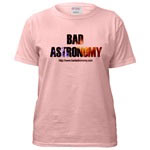
| Bad Astronomy |
|
|
|
BA Blog
|
|
Q & BA
|
|
Bulletin Board
|
| Media |
|
|
|
Bitesize Astronomy
|
|
Bad Astro Store
|
|
Mad Science
|
|
Fun Stuff
|
| Site Info |
|
|
|
Links
|
| RELATED SITES |
| - Universe Today |
| - APOD |
| - The Nine Planets |
| - Mystery Investigators |
| - Slacker Astronomy |
| - Skepticality |
Buy My Stuff

Keep Bad Astronomy close to your heart, and help make me
filthy rich. Hey, it's either this or one of those really
irritating PayPal donation buttons here.
Big Bang vs Steady State
Date: Sat Sep 7 20:50:53 1996Posted by: James W. Pulliam
Grade level: 10-12
School/Organization: Evansville North High School
City: Evansville State/Province: IN
Country: USA
Area of science: Astronomy
Message:
The recent findings of the Hubble Space telescope seem to indicate that galaxies at the edge of our instrumentation are very old despite the fact that the big bang theory would make them more bluish in colr instead of the red we see in the Hubble Wide field pictures. Is the Big Bang theory weakeing or do you think its still going to be the grant vehicle for more PHD thesis in this area.
Currently, the Big Bang theory is the best thing we have going to explain How We Got Here. The original argument involved the red shift of light from (supposedly) distant galaxies. Edwin Hubble observed this in the early part of the 20th Century. When spectra were taken of galaxies, it was found that almost all galaxies had spectra that were redshifted, and the simplest explanation of this is that it is due to a Doppler shift in the light from the galaxy, just like the way a train whistle drops in pitch when it heads away from you. So a feature in a spectrum from a galaxy heading away from us appears to change in "pitch"; in this case, shifts to the red end of the spectrum. Hubble interpreted this to mean that the Universe itself is expanding.
Over time, there has been tremendous support for the theory. The pivotal moment came when the cosmic microwave background was measured. If the Universe is expanding, it is logical to assume it was smaller in the past. Indeed, if you look far enough back, the Universe must have all occupied the same point. The expansion is interpreted as having started in a huge explosion-- the Big Bang. Any radiation left over from this explosion must still be out there, and red shifted as well. COBE (COsmic Background Explorer) was designed to measure this radiation, and it showed that the radiation conformed almost precisely to the Big Bang predictions.
These are the two big arguments for the Big Bang. Most astronomers feel that the Big Bang is the correct idea, but of course the Universe is in the details. There are some drawbacks to the theory, and the one currently under the most scrutiny is structure in the early Universe. The farther away we look, the farther back in time we look due to the finite speed of light. If we look all the way back as far as we can see and still see old objects, how can they have had time to form? Mind you, more than the Big Bang theory goes into these observations. For example, we see normal looking elliptical galaxies sitting there when the Universe was perhaps 5% of its current age. This is more of an indication of the incompleteness of our understanding of how galaxies form than of the age of the Universe. "How could they form so fast?" is the question most astronomers are asking, not "Is the Big Bang wrong?". You want to question things understood less first before you tackle tougher, more solid ideas.
There has not yet been a single, strong piece of evidence against the Big Bang, but there are several strong arguments for it. There also exist many completely independent pieces of evidence that support it as well. Hopefully over the next few years we will find even more pieces of this puzzle.
For more info, try going to The New Scientist page, which has lots of Big Bang related stuff.
|
|
MADSCI Q&A
Q&A 1996
Q&A 1997
Q&A 1998
Q&A 1999
Q&A 2000
| Subscribe to the Bad Astronomy Newsletter! |
| Talk about Bad Astronomy on the BA Bulletin Board! |